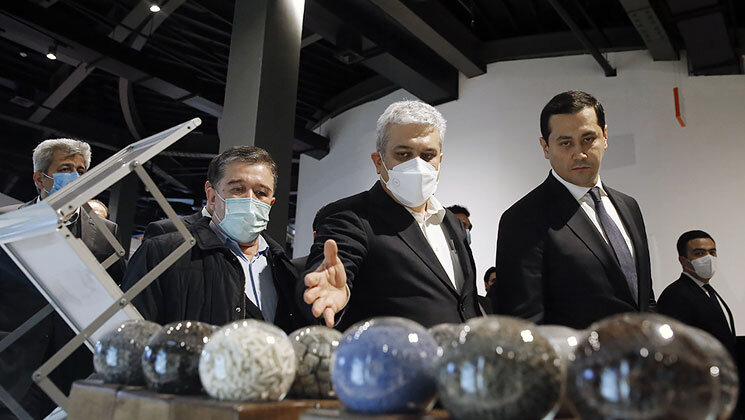Uzbekistan seeking to enhance technological cooperation with Iran

TEHRAN – Uzbekistan’s Deputy Prime Minister and Minister of Investment and Foreign Trade Sardor Umurzakov has announced readiness to develop technological cooperation with Iran.
Good opportunities exist for technological cooperation between the two countries and Uzbekistan is ready to interact with Iran in this field, appreciating Iran’s achievements in the field of technology, innovation, and development of knowledge-based firms, he added.
Umurzakov made the remarks during a visit to the permanent exhibition of Iranian technological products on Monday, with the presence of the Iranian Vice-President for Science and Technology, Sourena Sattari.
Referring to the establishment of the Uzbek Ministry of Innovative Development, he said that the nascent Ministry is willing to cooperate with Iran in the field of technology.
Stating that Iran’s experience can lead to the development of Uzbekistan’s science and technology parks, companies, and start-ups, he added that the two countries can even produce joint products.
Knowledge and research should be developed and scientific plans should be designed, but it is important that these plans are commercialized and realized in the field of production, he added.
Emphasizing the need to create a roadmap to form extensive cooperation in the field of science and technology, he suggested that an Uzbek delegation consisting of businesses and technology activists visit Iran to review all areas of the cooperation and create the roadmap.
Umurzakov also invited Sattari to his country to attend Tashkent International Investment Forum.
Referring to the activity of 6,500 knowledge-based companies and more than 1,500 creative companies, Sattari said that there are more than 10,000 startups in the country, which are among the leading ones in various fields of technology and innovation.
More than 98 percent of the country’s medicine is produced domestically by the efforts of knowledge-based companies. We now have the most powerful biotechnology companies in the region that export to other countries, he further explained.
Governments must prepare the ground for the interaction of entrepreneurs, professionals, and technologists on both sides, and in this direction, we are ready to lay the necessary groundwork, he also highlighted.
Science, technology advancement with knowledge-based ecosystem
Today, the country's knowledge-based ecosystem accounts for more than 3 percent of GDP. And the figure is projected to reach 5 percent, however, the main goal is to step toward a 10 percent share in GDP, Sattari told Fars on February 13.
The share of knowledge-based companies in the country's economy has exceeded 9 quadrillion rials (about $34 billion), and since 2019, it has experienced a growth of more than 450 percent, he stated.
The knowledge-based ecosystem is a newly-emerged ecosystem but has so far been able to solve many of the country's problems.
The Innovation and Prosperity Fund affiliated with the Vice Presidency of Science and Technology has earmarked a sum of 170 trillion rials (nearly $650 million) to support knowledge-based companies over the past 4 years.
There are currently 6,263 knowledge-based companies operating in the country, offering advanced products and services in various fields of technology to domestic and foreign markets, and some of them have entered international markets, Siavash Maleki, deputy head of the Fund, stated.
The fields of aircraft maintenance, steel, pharmaceuticals, medical equipment, oil, and gas are among the sectors that researchers in technology companies have engaged in, leading to import reduction.
FB/MG
